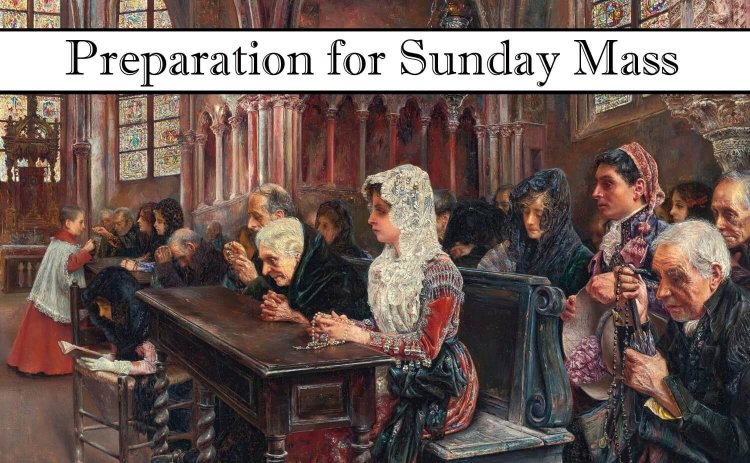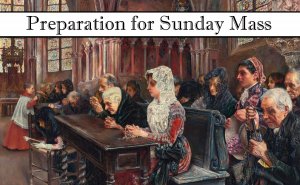The Family and the Church Militant
As it happens, I wrote about this very Sunday a couple of months ago, at the beginning of November. That’s because of when Easter fell last year. There were few Sundays between Epiphany and pre-Lent’s Septuagesima Sunday and empty slots […] The post The Family and the Church Militant appeared first on OnePeterFive.


As it happens, I wrote about this very Sunday a couple of months ago, at the beginning of November. That’s because of when Easter fell last year. There were few Sundays between Epiphany and pre-Lent’s Septuagesima Sunday and empty slots to fill before Advent 2021 began. Hence, this Sunday’s and next Sunday’s (5th and 6th) were ported over to the end of the liturgical year, “resumed,” to plug the gaps before the 24th and Last Sunday after Pentecost. See? Easy.
At this point I could simply redirect you to the piece I wrote in early November 2021 and call it a day at the beach. I am, instead, challenged to enter again into the magnificent treasure house that is every Catholic Sunday, to see what other mysteries could be opened to view.
The last time I wrote on this Sunday, I focused on the Gospel pericope (literally a “cutting out” or “selection” from Scripture especially for liturgical reading). This time we shall drill into the first reading, or Epistle, from St Paul’s Letter to the Colossians.
I’ll help you out with the text according to the Catholic edition of the Revised Standard Version (RSV-CE), which is the version I commonly use for my own study, together with the original languages and the Latin Vulgate. Don’t confuse this with the New Revised Standard Version which has serious problems due to its forced use of inclusive language, etc. It is also helpful to check different versions; most of them bring something worthwhile to the table. This Sunday’s Epistle for the Vetus Ordo, Colossians 3:12-17, would be heard in the Novus Ordo on the Feast of the Holy Family in all three years/cycles.
[Brethren:] Put on then, as God’s chosen ones, holy and beloved, compassion, kindness, lowliness, meekness, and patience, forbearing one another and, if one has a complaint against another, forgiving each other; as the Lord has forgiven you, so you also must forgive. And above all these put on love, which binds everything together in perfect harmony. And let the peace of Christ rule in your hearts, to which indeed you were called in the one body. And be thankful. Let the word of Christ dwell in you richly, teach and admonish one another in all wisdom, and sing psalms and hymns and spiritual songs with thankfulness in your hearts to God. And whatever you do, in word or deed, do everything in the name of the Lord Jesus, giving thanks to God the Father through him. [Missal: giving thanks to God the Father through Christ Jesus our Lord.]
A quick reading provides straight forward, practical advice for how to have harmonious and holy relationships with people, especially with your loved ones. No wonder it is read all three years in the Novus Ordo on Holy Family Sunday.
We can glean even more from this lovely passage. Sometimes when you get into the treasury room, the chests are tough to open. I will use as my crow-bar the Collect for Sunday’s Mass, which you will have heard immediately before this Epistle is read. Let’s have look into the Collect, first in Latin:
Familiam tuam, quaesumus, Domine, continua pietate custodi: ut, quae in sola spe gratiae caelestis innititur, tua semper protectione muniatur.
Latin custodio means “to watch, protect, keep, defend, guard.” It is common in military language. Innitor, a deponent verb, means “to lean or rest upon, to support one’s self by any thing.” Innitor also has military overtones. The thorough and replete Lewis & Short Dictionary provides examples from Caesar and Livy describing soldiers leaning on their spears and shields (e.g., scutis innixi … “leaning upon their shields” cf. Caesar, De bello Gallico 2.27). Munio is a similarly military term for walling up something up, putting in a state of defense, fortifying so as to guard.
Are you sensing a theme? Strong military imagery, ringing in the brilliant composer’s word choices, still echoes in our ears as Father or the Subdeacon reads or sings this Epistle. One word at the beginning of the Latin Collect rings changes with the military tones: familia… family or household.
Guard your family, we beseech you, O Lord, with continual mercy, so that that (family) which is propping itself up upon the sole hope of heavenly grace may always be shielded by your protection.
In our Collect we see, on the one hand, a family and, on the other, a group of soldiers, watchful but perhaps weary as they “lean” on their shields.
The concept of a family and the military imagery are not dissonant. In fact, we are both, are we not? We are both the true adopted sons and daughters of our loving Father God and we are the Church Militant, pilgrims soldiers sojourning in this vale of tears, on the march through dangers towards our heavenly fatherland. In the Collect the conceptual link between the two images seems to be the “sole hope of heavenly grace.”
Many of us who were confirmed in Holy Church’s Traditional Roman Rite, were given a blow on the cheek as a reminder of what suffering we might face as “soldiers of Christ.” Ironically, in the wake of the cruel Traditionis Custodes traditionally administered Confirmation is being suppressed by some, but not all, bishops. I’m sure you can imagine the hurt feelings and confusion for those young people and their families. The symbolic blow on the cheek in traditional Confirmation, part of the rubrics in the rite, might be the first time we Catholics “suffered” at the hands of bishops. It certainly isn’t going to be the last time, now that so many of them are giving us the back of their hand. But I digress.
Returning to our project, let’s use the content of the Collect, raised up just before the Epistle, to pry open the beautiful pericope from Colossians.
One of the gems that we can find is that, while there is a profound interconnection between the members of a family there is also an inequality just as in military units. Children are no less members of the family than their parents, but children are dependent, and they are not the equals of their parents. There is a hierarchy in the family.
When we consider the context of our Epistle reading, Colossians 3 continues with Paul’s admonishment to the different members of the family household, husbands, wives, children, and slaves, as there were in the ancient world:
Wives, be subject to your husbands, as is fitting in the Lord. Husbands, love your wives, and do not be harsh with them. Children, obey your parents in everything, for this pleases the Lord. Fathers, do not provoke your children, lest they become discouraged.
“Be subject, submit” from Greek hypotásso, a military term (there it is again) meaning to “arrange troops under a leader.” In non-military terms it indicates a voluntary assumption of responsibility or a burden. It sounds like quite the burden indeed! On the male side of things what do husbands have to do? All they must do is “love” their wives? They get off easy! Right?
Husbands are to “love,” Greek agapáo, their wives. It is the same verb used by the Lord when He says, “love your neighbor as yourself” (Matthew 19:19), and “love your enemies” (Luke 6:27). Not easy at all. And this is not to say that wives are enemies, of course. This agapáo is the same verb as in John 13 when, at the Passover, Jesus knew that His hour had come and, “having loved His own who were in the world, He loved them to the end.” In other words, He suffered and died on the Cross for us. Christian agape is the highest form of love, which is sacrificial. It is the love “that issues from a pure heart and a good conscience and sincere faith” (1 Tim 1:5). For a husband to love his wife, he must love her to the end, and even lay down his life for her.
Pope Pius XI, of happy memory, explained Paul’s “wives, be subject” in his 1930 encyclical about Christian marriage called Casti conubii:
This subjection, however, does not deny or take away the liberty which fully belongs to the woman both in view of her dignity as a human person, and in view of her most noble office as wife and mother and companion; nor does it bid her obey her husband’s every request if not in harmony with right reason or with the dignity due to wife; nor, in fine, does it imply that the wife should be put on a level with those persons who in law are called minors, to whom it is not customary to allow free exercise of their rights on account of their lack of mature judgment, or of their ignorance of human affairs….
The military images come back to put things into focus: hierarchy in the sense of headship and non-headship and absolute, mutual responsibility, each for the other. In this subordination, each member can fulfill his and her role each for the good of the other. In parents of children we have our officers and troops. The husband is the head and spiritual leader of the family. The wife is the heart and the emotional and relational leader of the family. Neither can function or live without the other. Remove one and the other dies. Different roles compliment and enrich.
It is also possible to emphasize the familial dimension and say, “Watch over your family, …with continual mercy/religious dutifulness…”, invoking more the image of a father checking into the bedrooms of their children while they sleep.
Merging the familial and martial together, the head of the family, father, listens in the night for sounds of distress or need, a soldier posted on watch who quietly says:
“Tonight, nothing is going to hurt you.”
This is the courage we need from our bishops and priests, the fathers of our families.
The post The Family and the Church Militant appeared first on OnePeterFive.














